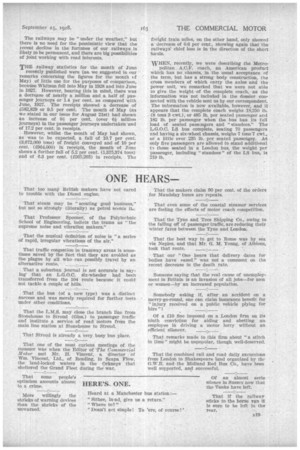ONE HEARS
Page 3

If you've noticed an error in this article please click here to report it so we can fix it.
That too mini British makers have not cared to trouble with the Diesel engine.
• That steam may be "scenting good business," but not so strongly (literally) as petrol scents it, —0 That Professor Spooner, of the Polytechnic School of Engineering, indicts the trams as the supreme noise and vibration makers."
That the musical definition of noise is "a series of rapid, irregular vibrations of the air."
That traffic congestion in tramway areas is sometimes saved by the fact that they are avoided as the plague by all who can possibly travel by an alternative route. • .
That a suburban journal is not accurate in saying that an L.G.O.C. six-wheeler had been transferred from the 104 route because it could not tackle a couple of hills.
That the bus (of a new type) was a distinct success and was merely required for further tests under other conditions.
That the L.M.S. may close the branch line from Stonehouse to Stroud (Glos.) to passenger traffic and institute a service of road motors from the main line station at Stonehouse to Stroud.
That Stroud is already a very busy bus place.
That one of the most curious meetings of the summer was when the Editor of 'The Commercial Motor met Mr. H. Vincent, a director of Wm. Vincent, Ltd., of Reading, in Scapa Flow, the land-locked waters in the Orkneys that sheltered the Grand Fleet during the war.
That some people's optimism amounts almost to a crime.
More willingly the shrieks of warning devices than the shrieks of the =warned: That the makers claim 90 per cent. of the orders for Maudslay buses are repeats.
That even some of the coastal steamer services are feeling the effects of motor coach competition.
That the Tyne and Tees Shipping Co., owing to the falling off of passenger traffic, are reducing their winter fares between the Tyne and London.
That the best way to get to Rome was by sea via Naples, and that Mr. G. M. Young, of Albions, took that route.
That our "One hears that delivery dates for bodies have eased " was not a comment on the recent decrease in the death rate.
Someone saying that the real cause of unemployment in Britain is an invasion of all jobs—for men or women—by an increased population.
Somebody asking if, after an accident on a merry-go-round, one can claim insurance benefit for "injury received on a public vehicle plying for hire "!
Of a £10 fine imposed on a London firm on its ninth conviction for aiding and abetting an employee in driving a motor lorry without an efficient silencer.
That remarks made to this firm about "a stitch in time" might be unpopular, though well-deserved.
That the combined rail and road daily excursions from London to Shakespeare land organized by the G.W.R. and the Midland Red Bus Co., have been well supported, and successful.
Of an almost eerie silence in Sussex now that the Tanks have left.
That if the railway sticks to the horse van it is sure to be left in the rear.
































